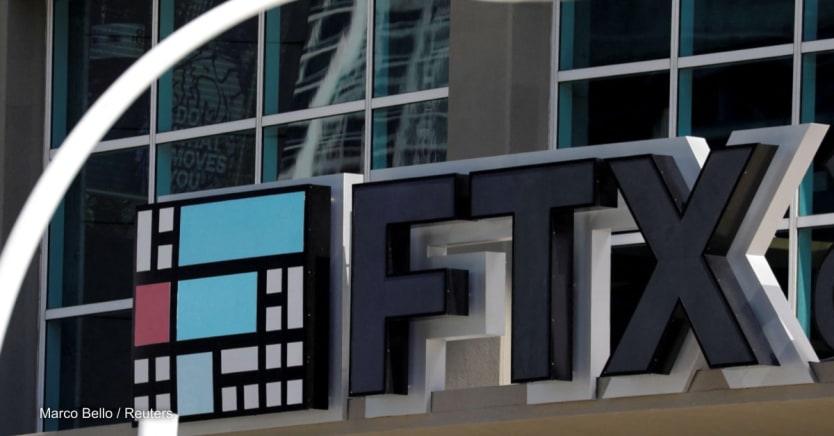
Sam Bankman-Fried, the founder of the cryptocurrency exchange FTX, started the now failed crypto-firm because he wanted to make a lot of money — to give it away.
This strategy, often referred to as “earning to give,” drives people to high-paying jobs so they can give half or more of what they earn to help others.
SBF, as he’s long been referred to, emerged as one of the most visible donors in effective altruism, or EA, a movement in philanthropy that encourages donors to use reason and evidence to do the most good with each dollar.
Over time, effective altruism moved from the niche to the mainstream, in part because of the growing number of tech billionaires who embraced it.
But now, FTX has filed for bankruptcy, its founder is enmeshed in scandal, and the cryptocurrency’s collapse has spread panic among nonprofits that had received funds, or were seeking donations, from SBF, who had a net worth of $26 billion at the peak of his fortune, before his personal wealth plummeted overnight.
In trying to do good, SBF has damaged the reputation of effective altruism, a community of donors that has to reckon with some tough questions.
Between the direct impact on nonprofits, and the indirect impact on a growing movement within philanthropy that has steered significant funding to people in low-resource settings, FTX’s collapse could jeopardize causes that have appealed to effective altruists, from animal welfare to global health.
How nonprofits lost money overnight
As more details of SBF’s wrongdoing emerged, leaders of the FTX Future Fund, one of the philanthropic arms of FTX, resigned in an open letter.
“We are now unable to perform our work or process grants, and we have fundamental questions about the legitimacy and integrity of the business operations that were funding the FTX Foundation and the Future Fund,” wrote the former leaders, including Nick Beckstead, who worked for the Open Philanthropy Project. “We are devastated to say that it looks likely that there are many committed grants that the Future Fund will be unable to honor. We are so sorry that it has come to this.”
As a result of FTX’s implosion, many nonprofits, and the causes and people they serve, had the rug pulled out from under them, losing funding they were counting on.
The team at the Rajalakshmi Children Foundation, an India-based group that received a grant from the FTX Future Fund to support the online education of children who excel in math, science, and technology, came across the news in the Effective Altruism Forum.
“We have not received any communication from the foundation,” Akash Kulgod, one of its team members, told Devex via email.
Rajalakshmi Children Foundation was expecting multiyear support from the FTX Future Fund, and is now scrambling to find other donors to fill that gap.
On Wednesday, Open Philanthropy, a research and grant-making organization funded by effective altruist billionaires Cari Tuna and Dustin Moskovitz, announced on the same EA forum that it may support charitable organizations that have been impacted by FTX’s collapse.
But some organizations that received funding tied to SBF or FTX are distancing themselves or cutting ties entirely.
For example, the Future Fund gave Stanford University’s Center for Innovation in Global Health $1.5 million for seed grants to support innovations to prevent the next pandemic.
But, as The Washington Post reported, Stanford took the announcement down.
And, experts told Devex, even leaders of nonprofits who have never raised money from SBF or FTX are likely to see this unfolding saga as a cautionary tale around the donors they approach and the money they accept.
What the scandal could mean for effective altruism
The FTX crash might “curb the growth” of effective altruism, said Brian Mittendorf, a professor of accounting at Ohio State University who specialized in nonprofit financing.
One benefit of the movement’s growing prominence is the way it shines a light “on needs and people not otherwise proximate to donors,” he said, including people living in faraway countries or even future generations.
“Dimming that light could have broader ramifications for charitable giving and international development,” Mittendorf said in an email to Devex.
But not everyone agrees the reputational blow SBF dealt to effective altruism will hurt the causes that benefited from it.
“It isn't going from ‘FTX was a fraud’ to ‘We shouldn’t be funding bed nets,’” said Tim Ogden, managing director of the Financial Access Initiative, an adjunct professor at New York University’s graduate school of public service. Ogden is also the board chair of GiveWell, a nonprofit charity evaluator that is highly influential among effective altruists and plans to direct $1 billion annually to programs it identifies as cost-effective by 2025.
While the FTX collapse may cause short-term damage to the effective altruism brand, that’s not likely to spill over to the causes EAs support, argues Charlie Bresler, co-founder and board member at The Life You Can Save.
“I don’t think the causes they support that are so important, like helping fight the devastating effects of extreme poverty or the cruelty of factory farming or anything related to public health matters in the developing world, will even in the medium term be affected,” he said.
The Life You Can Save is a charity assessment organization co-founded by Peter Singer, who authored a book that played a major role in the formation of effective altruism. It aims to serve as a marketing organization of sorts, appealing to people who have never heard about Singer or the movement, but are interested in effective giving to reduce extreme poverty, Bresler said.
The Life You Can Save occupies the space between GiveWell, which recommends charities that fit its strict criteria, and Charity Navigator, the largest independent evaluator of nonprofits in the United States, which traditionally has rated nonprofits based on financial transparency, including overhead costs, rather than impact per dollar spent.
SBF’s investments in pandemic preparedness
Bankman-Fried plowed significant money into causes aligned with longtermism, a branch of effective altruism focused on the long-term future and threats such as advanced artificial intelligence. The global health community, with its focus on saving lives today, has looked at longtermism with great skepticism, Ogden said. But pandemic preparedness, an area Bankman-Fried backed, is a cause that falls under both longtermism and global health.
“As an outside observer, I would be concerned that pandemic preparedness causes get caught up in the pointing and laughing at longtermism because of the situation,” Ogden said. “The most plausible channel of contagion is the connection of FTX to longtermism; longtermism to pandemic preparedness; pandemic preparedness to actually delivering vaccines.”
Bankman-Fried had directed tens of millions of dollars toward pandemic preparedness, and many of those efforts lost that funding overnight.
But some argue that he might have been doing more harm than good in that space anyway.
Dr. Angela Rasmussen charged in a Twitter thread that some of the grants funded by SBF and his brother Gabe Bankman-Fried — who until recently was the director of Guarding Against Pandemics, an advocacy organization financed by SBF — went to dubious companies that implied virologists “with a penchant for evildoing” could start future pandemics.
“They spent vast sums of money on these efforts, funding research, political campaigns, and media outlets focused on ‘improving biosecurity,’ which is evidently code for antagonizing legitimate virology research,” she argued.
An opportunity for change
In response to the unraveling of FTX, and its founder, leaders within the effective altruism movement have clarified that “earning to give” does not support the mentality that “the ends justify the means.”
“Sam and FTX had a lot of goodwill — and some of that goodwill was the result of association with ideas I have spent my career promoting,” said Will MacAskill, a philosopher who founded the Centre for Effective Altruism at Oxford University, in a Twitter thread. “If that goodwill laundered fraud, I am ashamed.”
It was MacAskill who initially presented SBF with the idea of earning to give, and the EA leader acknowledged that he and the community as a whole needed to do some soul searching.
“We must make clear that we do not see ourselves as above common-sense ethical norms, and must engage criticism with humility,” he said.
Many argue that the effective altruism community should use this moment as an opportunity to change course.
The movement draws some of “the most advantaged people in the world,” Olúfẹ́mi O. Táíwò, assistant professor of philosophy at Georgetown University, told Devex.
He said the main point of contention between himself and colleagues who are EAs or sympathetic to EAs has to do with the role of power in philanthropy.
The effective altruism community narrows in on problems where “the solutions are primary allocative” or, in other words, solved by money.
And the SBF fraud illustrates how the EA culture could become “a playground for wealthy donors,” as he warns in a recent piece in The Guardian.
“I do think there’s an outside shot that they genuinely internalize some hard questions,” he said.








